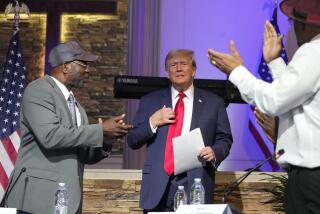Racial Unrest Presents a Touchy Dilemma for Clinton : Democrats: He has sought unity and reconciliation, but has exhorted minorities on ‘personal responsibility.’
- Share via
LITTLE ROCK, Ark. — Nothing has been more central to Arkansas Gov. Bill Clinton’s presidential campaign stump speech than his impassioned calls for renewed efforts to bridge the jagged divisions between black and white America.
This week’s painful evidence of those divisions has given Clinton’s pleas for unity a new urgency. On Friday, for example, Clinton called on Americans to make Sunday a national day of prayer aimed at “reaffirming the solidarity of the human family.”
Later, Clinton also reacted to President Bush’s address to the nation, saying, “I think the President did a good job tonight in taking the steps he should have taken,” including federalizing the national guard.
But the violence and rage that erupted following the not-guilty verdicts in the Rodney G. King beating case also have highlighted the fine line Clinton is walking as he seeks new ways of grappling with the American dilemma of race--and the Democratic dilemma of white disaffection from the party in presidential elections.
Clinton’s campaign has been marked by both frank pleas for racial reconciliation and equally candid remarks on the need for minorities and the poor to exercise “personal responsibility” as part of dealing with their problems--a subject that has been virtually taboo in Democratic circles for a quarter century.
In effect, Clinton has sought a synthesis that attempts to defang racism as a political weapon, while implicitly rejecting it as the sole excuse for the lingering disparities between black and white America.
At times, Clinton has stumbled across the racial divide: He came under intense criticism in late March for playing golf at a Little Rock country club that has no black members. But through the primaries, his carefully balanced message has helped him win the lion’s share of both blacks and working-class whites.
In the polarizing aftermath of the King verdicts, Clinton initially appeared uncertain how to maintain that balance.
At first on Thursday, Clinton emphasized his distress at the not-guilty verdicts, and expressed sentiments approaching empathy for those who took to the streets in its aftermath. But by late Thursday, as he spoke to an integrated crowd of supporters in Birmingham, Ala., Clinton’s tone had demonstrably hardened, even as he continued to criticize the verdicts.
He told his audience: “We should say to our fellow Americans in Los Angeles, no matter how angry you are, no matter how aggrieved you are, stop the violence and stop it now. The verdict in the King trial is not an excuse to burn or to steal or to maim or to kill; it is wrong.”
But even with the strong denunciations of disorder, the Birmingham speech illustrated less a move to the right than a reassertion of the core theme of mutual obligation that represents Clinton’s signal departure from traditional liberal and conservative thinking on race.
In his remarks at a downtown park, Clinton stressed the obligations of society to heal racial wounds and invest in forgotten neighborhoods. But he also lamented the breakdown of the family and other institutions in many inner cities, and acknowledged the limits of government’s ability to improve conditions without changes in the way individuals conduct their lives.
“No President,” he declared, “can promise to wipe the stain of crime and drugs and lost human wreckage away from the spirit of any community in America, unless the people in the community are willing to take responsibility, each and every one of them, to lift up the children in those communities.”
And he said that inequality can excuse neither the rioting and looting that has devastated Los Angeles, nor the routine urban violence that preceded it.
“Crime breeds poverty, as much as poverty breeds crime,” he asserted. That’s an unusual formulation for a Democrat; most, like former California Gov. Edmund G. (Jerry) Brown Jr., Clinton’s last remaining rival for the Democratic nomination, put more emphasis on the role of deprivation in fomenting crime.
Clinton’s analysis of inner-city violence departed from traditional Democratic thought in another key respect: He linked it not only to poverty, but to the erosion of the family in many neighborhoods. “Let’s not kid ourselves,” he said. “So many people who go into these gangs and deal drugs and commit acts of violence were never the most important person in the world to anyone.”
Many of those observations echoed arguments favored by conservatives; but Clinton went further to insist that the broader society must accept responsibility to invest more in education, health care and job training. And he insisted that America cannot afford--either economically or socially--continued inequality and division along racial lines.
More to Read
Get the L.A. Times Politics newsletter
Deeply reported insights into legislation, politics and policy from Sacramento, Washington and beyond. In your inbox twice per week.
You may occasionally receive promotional content from the Los Angeles Times.









